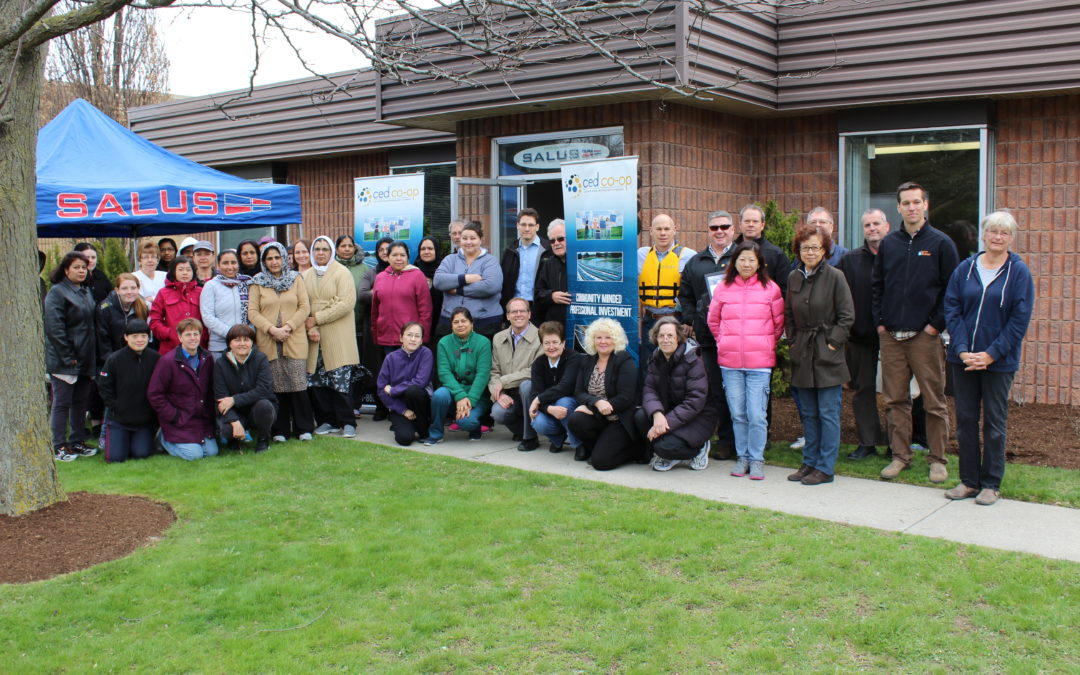TREC’s recently published report, The Power of Community explores the economic, environmental, and social benefits of locally owned and operated renewable energy initiatives. In general, community owned renewables lead to higher job creation; stronger economic impacts and better social license to develop projects compared to commercially developed projects. Since the creation of the Feed-in Tariff program under Ontario’s Green Energy and Green Economy Act, community participation in renewable energy has increased dramatically. This week, we’re profiling a few co-operatives leading the way in establishing locally-owned renewables in Ontario.
Community Energy Development Co-operative
Since its inception, Community Energy Development (CED) Co-op has generated over 2,500,000 kWh of renewable energy, avoiding over 1,000,000 kg of CO2 emissions to date. Through its first bond offering, CED Co-op has raised $9.6 million from over 600 members to finance 27 solar projects all over Ontario. CED Co-op is currently offering investment in a new 5-year bond, at a rate of 6.13%.
Below is an interview with CED Co-op’s Marketing Coordinator Taylor Weber:
Why are your members interested in joining / supporting / investing in CED Co-op?
CED Co-op members and investors believe in community power and professional investment. They understand the need to take action to reduce climate change through renewable energy generation, and the power that a like-minded community of individuals can have to drive change. At the same time, CED Co-op investors know that impactful investing doesn’t mean sacrificing returns – they can align their investments with their values.
How do CED Co-op projects benefit your surrounding community?
Renewable energy projects from CED Co-op are often partnerships with local businesses. CED Co-op provides expertise in developing solar projects, while the business has the real estate for the installation. Together we share the revenue earned from electricity generation, and help the business raise their profile as a community leader and supporter of renewable energy.
CED Co-op projects also benefit the local economy through job creation. The team it takes to design and install each solar system is local, which means money spent to develop the project is reinvested in the local economy.
Members in CED Co-op live in the same communities as the projects we are installing. They can see the benefit of clean energy being delivered to the grid where they live, work, and play, and take pride in their contribution to a greener economy. When CED Co-op members earn a return on their investment in renewable energy those dollars stay in communities, instead of adding to the bottom line of an outside corporation.
What have been your biggest challenges?
CED Co-op has faced a number of challenges, including achieving RRSP/TFSA eligibility for the members investments in the Co-op, navigating the regulatory environment in order to raise funds from members and investors, working with lenders to find ways to provide funds to a portfolio of projects that involves many different partners, and navigating the continually changing landscape of receiving power contracts through the Feed-In Tariff Program.
Why does Community Power matter?
Community Power drives local benefit and a sense of ownership in our future. Through community membership local owners feel a sense of pride and support for renewable energy projects; through community installation jobs are created and local economies are bolstered; and through community investment wealth is reinvested locally.
Learn more at cedco-op.com

